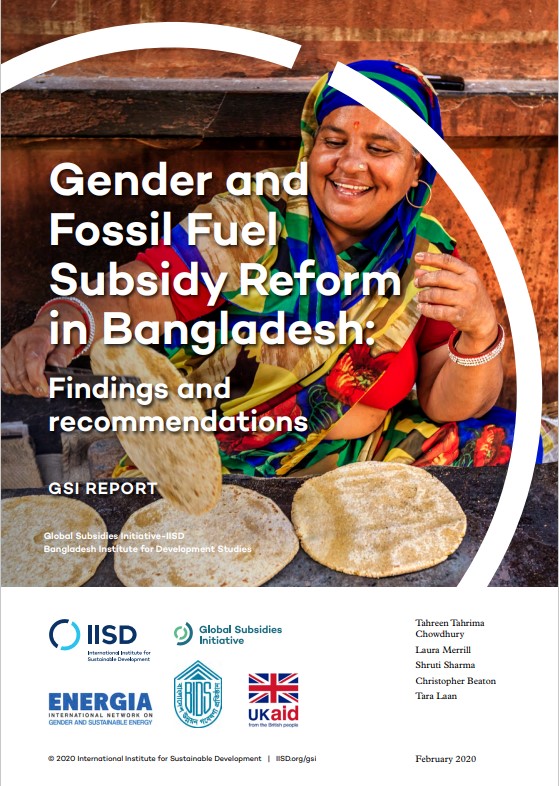🌿 COP 30 - Building a Greener Tomorrow
The 30th UN Climate Change Conference (COP 30) is taking place in Belém, Brazil. Stay informed about global climate actions, negotiations, and live sessions from 10 – 21 November 2025.
Get Updates
Gender and Fossil Fuel Subsidy Reform: Findings from and recommendations for Bangladesh

Files
Date
January, 2024Author(s)
- Tahreen Tahrima Chowdhury (BIDS)
- Laura Merrill (GSI)
- Shruti Sharma (GSI)
- Christopher Beaton (GSI)
- Tara Laan (GSI)
Abstract
The report examines from a gender perspective the impact of subsidies and reform to kerosene in Bangladesh. The research was based around two overall research questions: “How do existing kerosene policies affect the welfare, productivity and empowerment of women and girls in low-income households?” and “How might this change given a change in subsidy policy or mitigation measures?” These questions were explored using secondary data, household surveys (that reached 630 households) and focus group discussions. The questions were answered within the context of hypotheses made during the scoping phase and literature review for the research. This research attempted to answer the above questions in relation to an income effect, energy use effect and an energy supply effect, from a gender perspective. The report is part of a broader project that also examined gender and fossil fuel subsidies in India and Nigeria. The research concludes with five overarching findings. First, overall fuel subsidies are not working well for poor women. Second, better targeting of support for energy access is both needed and possible. Third, subsidy reform needs to be undertaken with care, and mitigation measures are needed to protect poor women. Fourth, other factors could be significant for fuel switching and better access to cleaner fuels for women. Finally, investing in subsidy alternatives could empower women more directly. A summary of these and other findings, including those from across the three countries, can be found at the end of this report. Bangladesh is a “high-impact” country in that the total number of people without access to electricity or clean cooking is among the highest in the world. Like many countries, Bangladesh is reviewing energy subsidies, undergoing reforms, and increasing prices, but it also has goals to increase energy access and women’s empowerment. These reforms present an opportunity for policy-makers to deliver and target policies that cluster gender and energy access benefits toward poor, often rural, women and ensure that no one is left behind.
Citation
Global Subsidies Initiative-IISD and Bangladesh Institute of Development Studies. (2020). Gender and fossil fuel subsidy reform in Bangladesh: Findings and recommendations. Winnipeg: IISD
Publisher
IISD
Rights Holder
IISD
URI
https://knowledgehub.pksf.org.bd/collections/UzNtYjhoRlZsU0RGLytwNkpMUGJrdz09
